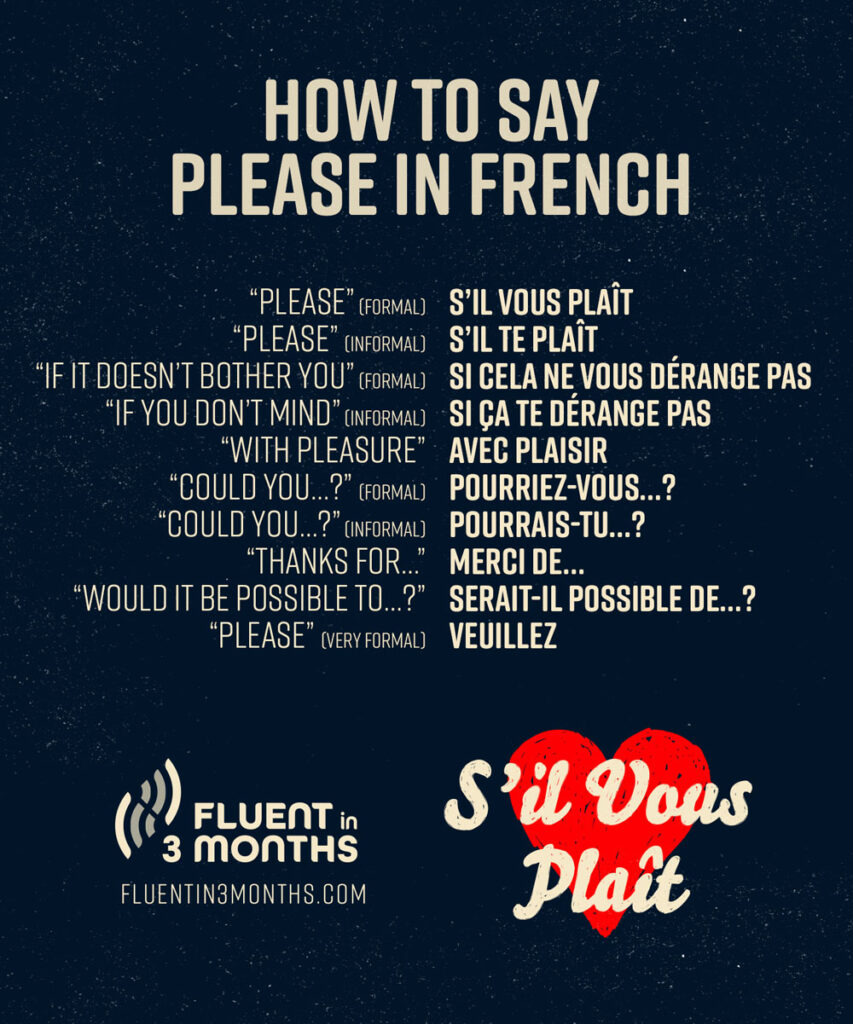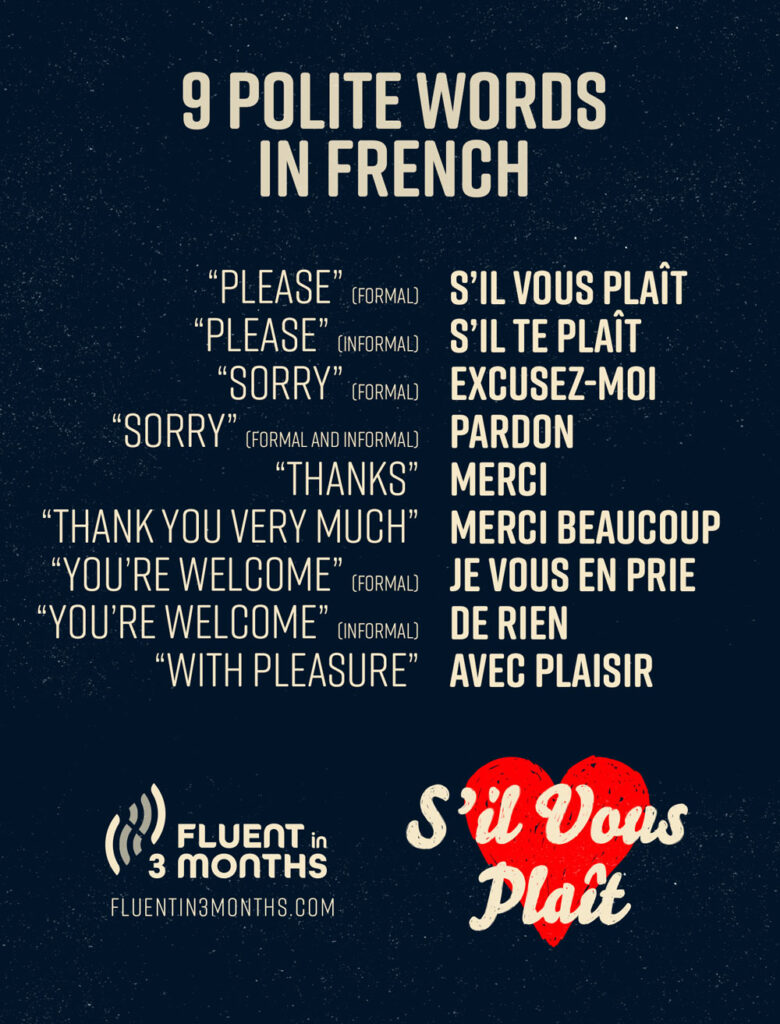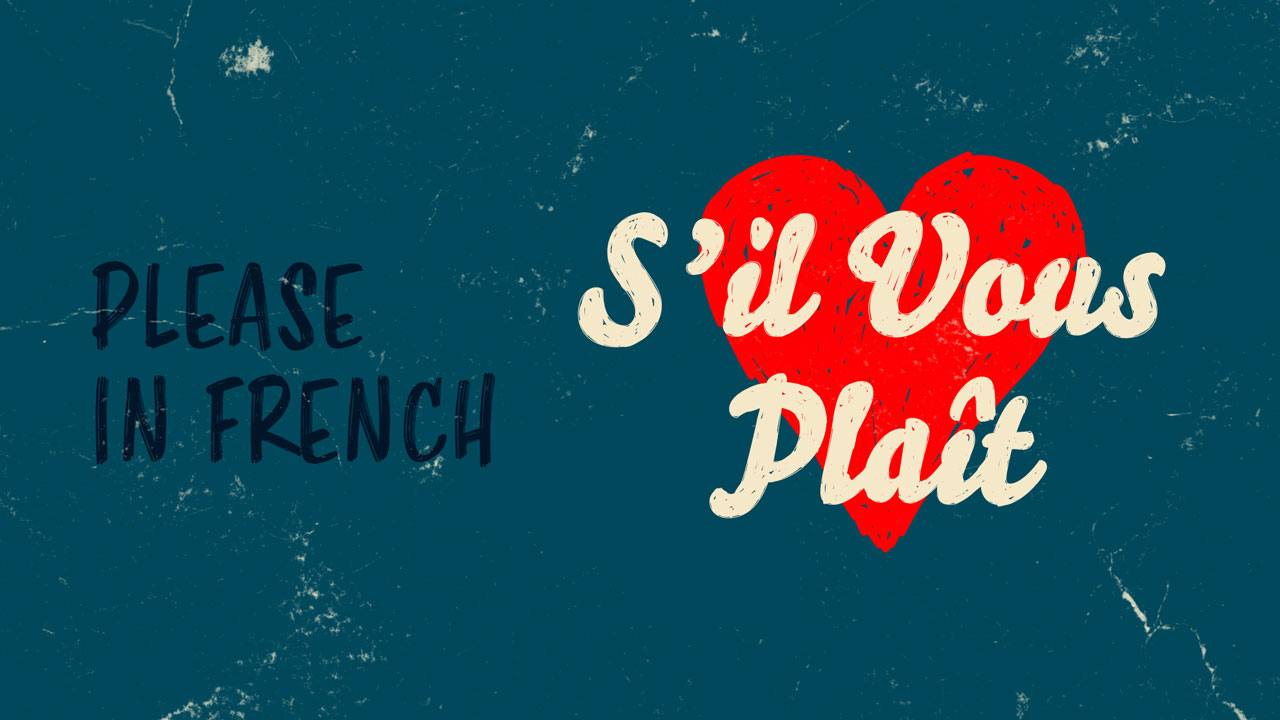How to Say Please in French (with Audio)
The most common ways to say please in French are s’il vous plaît and s’il te plaît.
You use them when you’re requesting something, ordering food, or asking permission, similar to English. Using these words makes a big difference in how you are perceived, so s’il vous plaît and s’il te plaît are often among the first phrases beginners learn in French.
Table of contents
- S’il Vous Plaît and S’il Te Plaît: “Please” in French
- Si Cela ne Vous Dérange Pas and Si Ça Te Dérange Pas : “If It Doesn’t Bother You”
- Avec Plaisir: “With Pleasure”
- Pourrais-tu… or Pourriez-vous… “Could you…”
- Merci de + infinitive verb: “Please + verb”
- Serait-il possible de… “Would it be Possible to…”
- Veuillez: The Formal Please
- Other Polite Words and Phrases in French
- A Lot of Ways to Say Please in French!
If your French goes beyond the beginner level, you’re probably already familiar with s’il vous plaît and s’il te plaît. But with the French language, learning never ends! Check the vocabulary list below to see if you know all the words for please in French:
ople you don’t know, such as a waiter, store clerk, or an acquaintance. Here are some examples:
- Un café, s’il vous plaît. “A coffee, please.”
- Pourriez-vous m’aider, s’il vous plaît ? “Could you help me, please?”
- Pourriez-vous m’envoyer les documents s’il vous plaît ? “Could you please send me the documents?”
With friends, family, and children, you can use s’il te plaît. This is a more casual, informal way
| English | French | Audio |
|---|---|---|
| “Please” (formal) | S’il vous plaît | |
| “Please” (informal) | S’il te plaît | |
| “If it doesn’t bother you” (formal) | Si cela ne vous dérange pas | |
| “If you don’t mind” (informal) | Si ça te dérange pas | |
| “With pleasure” | Avec plaisir | |
| “Could you…?” (formal) | Pourriez-vous…? | |
| “Could you…?” (informal) | Pourrais-tu…? | |
| “Thanks for…” | Merci de… | |
| “Would it be possible to…?” | Serait-il possible de…? | |
| “Please” (very formal) | Veuillez |

Now let’s cover them in detail:
S’il Vous Plaît and S’il Te Plaît: “Please” in French
Literally translating to “if it pleases you,” s’il vous plaît and s’il te plaît mean “please” in French. The difference between them is the formality level. You would use s’il vous plaît in formal situations, with people you address with the formal vous pronoun. This includes peof saying “please.”
- Passe-moi le sel, s’il te plaît. “Pass me the salt, please.”
- Tu peux m’aider s’il te plaît? “Can you help me please?”
- Attends-moi, s’il te plaît. “Wait for me, please.”
In everyday speech, you’ll often hear shortened versions of s’il te plaît, which will sound more like s’te plaît. Although common, this shortened version is quite informal, so use them only with people you know well.
- Maman, s’te plaît, on peut aller au parc ? “Mom, please, can we go to the park?”
- Attends, s’te plaît, j’arrive ! “Wait, please, I’m coming!”
Similarly, when texting, French people often write stp instead of s’il te plaît.
Si Cela ne Vous Dérange Pas and Si Ça Te Dérange Pas: “If It Doesn’t Bother You”
For bigger requests that might cause an inconvenience, you can use the expression si cela ne vous dérange pas, which means “if it’s not too much trouble” or “if it doesn’t bother you.” We can say that it’s an extra polite, indirect way of saying please. As the vous in si cela ne vous dérange pas hints, this is a formal phrase, used with authority figures or people you don’t know well. For example:
- Si cela ne vous dérange pas, pourriez-vous répondre au client concernant cette question? “If it’s not too much trouble, could you respond to the client regarding this issue?”
- Si cela ne vous dérange pas, pourriez-vous me donner votre avis sur ce document? “If it doesn’t bother you, could you give me your feedback on this document?”
The more informal version of si cela ne vous dérange pas would be si ça te dérange pas, translating to “if you don’t mind” or “if it doesn’t bother you.”
- Si ça te dérange pas, j’aimerais bien emprunter ton vélo pour la journée. “I’d like to borrow your bike for the day if you don’t mind.”
- Si ça te dérange pas, tu pourrais garder mon chat ce weekend? “If you don’t mind, could you look after my cat this weekend?”
Avec Plaisir: “With Pleasure”
Avec plaisir means “with pleasure,” often used when accepting offers. For example, when someone offers you something nice, like a drink, food, or help with something, you can respond with oui, avec plaisir. This means “Yes, with pleasure,” “yes please,” or “I’d be happy to.”
Let’s take a look at the dialogue below, between Sophie and Marc:
Sophie: Est-ce que tu voudrais venir dîner chez moi ce samedi ? Je vais cuisiner du bœuf bourguignon. (Would you like to come over for dinner this Saturday? I’ll cook Burgundy beef.)
Marc: *Oui, avec plaisir ! C’est mon repas français préféré ! * (“Yes, with pleasure ! It’s my favorite French meal!”)
In the example above, it turns out that Sophie is cooking Marc’s favorite French meal. He accepted the offer by saying avec plaisir, as it’s a more enthusiastic way of saying “yes please” or “thank you.”
Pourrais-tu… or Pourriez-vous… “Could you…”
A nice way to ask for something is to use the verb pouvoir (“can/to be able to”) in the conditional tense. Say Pourrais-tu to family and friends, and Pourriez-vous in more formal situations. These are already polite ways of making requests, but add s’il te/vous plaît to the end to be even more polite.
Here are some examples:
- Pourrais-tu me prêter ton stylo s’il te plaît ? “Could you lend me your pen, please?”
- Pourriez-vous me dire quelle heure il est ? “Could you tell me what time it is?”
- Pourriez-vous parler un peu plus lentement, s’il vous plaît ? “Could you speak a bit more slowly, please?”
Merci de + infinitive verb: “Please + verb”
Another way to politely ask for something is with the expression merci de followed by an infinitive verb. It translates to thanks for, and implies you’re thanking the person in advance for doing what you’re about to ask.
For example, merci de patienter means “thanks for waiting,” usually said before you start waiting. We can also say patientez s’il vous plaît (“wait, please”) but merci de patienter sounds more formal and professional. This is why you would often see it in customer service contexts.
Here are some common French verbs you’d often see with merci de.
- Merci de patienter “Thanks for waiting”
- Merci de me rappeler “Thanks for calling me back”
- Merci de faire attention “Thanks for being careful/paying attention”
- Merci de me tenir au courant “Thanks for keeping me informed”
Serait-il possible de… “Would it be Possible to…”
Serait-il possible de… (“Would it be possible to…”) is a useful phrase when you want to soften your request. If you want to make it even more polite, you can add a s’il vous plaît or a s’il te plaît to the end.
Some examples:
- Serait-il possible de réserver une table pour ce soir ? “Would it be possible to reserve a table for tonight?”
- Serait-il possible de reporter notre rendez-vous à demain, s’il vous plaît ? “Would it be possible to reschedule our appointment to tomorrow?”
Veuillez: The Formal Please
Veuillez is a formal French verb form that translates closely to please in English, but with a more formal and imperative tone. It comes from the verb vouloir, which means “to want.”
You’ll see veuillez in the beginning of sentences, usually in written communications and formal speeches. It’s a formal way to command or request someone to do something, in a polite yet direct way. Here are some examples:
- Veuillez patienter un moment, s’il vous plaît. “Please wait a moment.”
- Veuillez m’envoyer les informations dès que possible. “Please send me the information as soon as possible.”
- Veuillez entrer votre code secret. “Please enter your PIN.”
Other Polite Words and Phrases in French
There are several other polite words and phrases that might come up in the same conversation as “please” in French. Here are the most common ones:
| English | French | Audio |
|---|---|---|
| “Please” (formal) | S’il vous plaît | |
| “Please” (informal) | S’il te plaît | |
| “Sorry” (formal) | Excusez-moi | |
| “Sorry” (formal and informal) | Pardon | |
| “Thanks” | Merci | |
| “Thank you very much” | Merci beaucoup | |
| “You’re welcome” (formal) | Je vous en prie | |
| “You’re welcome” (informal) | De rien | |
| “With pleasure” | Avec plaisir |

A Lot of Ways to Say Please in French!
As you can see, the word for “please” in French often depends on the formality level and context.
While s’il vous plaît and s’il te plaît will be the words you use the most, the other words for “please” in French will be important in your daily life.
Combine please with other polite words, such as thank you and sorry — you’re halfway there for everyday conversations!



Social